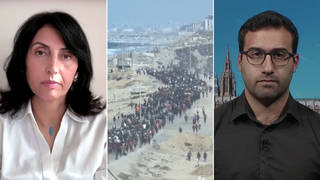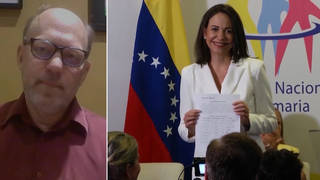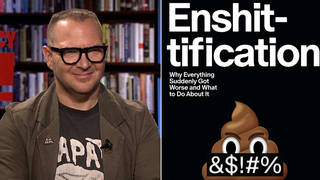
Topics
We get an update on the condition of jailed former Haitian Prime Minister Yvon Neptune who has been on a hunger strike for 18 days and is reportedly near death. We go to Haiti to speak with human rights activist Patrick Elie who served as Haiti’s Drug Czar and Undersecretary of State for Defense under Jean Bertrand Aristide and we speak with lawyer Brian Concannon. [includes rush transcript]
Yvone Neptune–the former prime minister of Haiti–is critically ill and reportedly near death after 18 days of a hunger strike.
Neptune has been in jail for the past 10 months and has yet to see a judge in his case. The US-backed interim Haitian government recently charged him with having a role in a series of political killings in the town of St. Marc in February 2004.
Earlier this week, the government offered to take Neptune to the neighboring Dominican Republic for medical care, but he refused and demanded he first be released and the charges dropped.
Neptune’s continued imprisonment has been condemned around the world. The chief of the Haiti U.N. mission’s human rights division Thierry Fagart told reporters “The fundamental rights, according to national and international standards, have not been respected in the case of Mr. Neptune.”
In Washington on Wednesday, the head of the Organization of American States called for a joint Haitian-international commission to try to quickly resolve the impasse over Neptune’s imprisonment.
- Patrick Elie, human rights activist in Haiti. Under the first government of Jean Bertrand Aristide, he served as Haiti’s Drug Czar and Undersecretary of State for Defense. He was one of the key figures in dismantling the Haitian military. He has recently met with Yvon Neptune.
- Brian Concannon, director of the Institute for Justice and Democracy in Haiti. Last month–along with law students at the University of California and Haitian attorneys–he helped file a petition with the Inter-American Commission on Human Rights on behalf of Haiti’s former Prime Minister Yvon Neptune.
Transcript
AMY GOODMAN: We go now to Haiti, to speak with Patrick Elie, a human rights activist in Haiti, who in fact was the Drug Czar under the first Aristide administration. He also was the Secretary of Defense under that administration and was in charge of dismantling Haiti’s army. We turn now to Patrick Elie. Welcome to Democracy Now!
PATRICK ELIE: Thank you for giving me a chance to speak first of all for a man’s life, which has been put in danger by a government that revealed itself for what it is, that is a government [inaudible] sociopolitical treason. Because from the minute they have been installed in power, they have been out to clean the country out of everybody that was Lavallas, but also to terrify, to terrorize the poor people, especially in the capital. And I think that in Yvon Neptune’s case, you have seen in a nutshell all that is wrong with this government. He was told that this government came to appease the country, to promote reconciliation and a year later, this country is torn more than ever, and the demand of security is only met with more repression. That’s all this government has to offer. And you know, all of the things that —
AMY GOODMAN: We’re going to try to get a better line for you speaking from Haiti, and we’re going to turn now to Brian Concannon, he is the Director of the Institute for Justice and Democracy in Haiti. Last month, along with law students at the University of California and Haitian attorneys, he helped file a petition with the Inter-American Commission on Human Rights on behalf of Yvon Neptune. Brian Concannon, as we try to clear up the phone line with Patrick Elie in Haiti, can you talk about what you understand to be Yvon Neptune’s condition at this point and where he is?
BRIAN CONCANNON: He is in a hospital facility, actually they created a special house for him, and ironically enough, some of the people who had attacked his regime. He is in a prison hospital. His situation is very bad. Back on Saturday, a group of Argentinean doctors visited him and said that he was in an extremely dire situation. And now we are five days beyond that. Over the weekend, he did actually start drinking water. But from my reports, he is starting to have irreversible internal organ damage. He’s barely conscious, and he’s very close to death.
AMY GOODMAN: Explain what it is that — why it is that he is on this hunger fast for almost three weeks.
BRIAN CONCANNON: He is on a fast because the Haitian government has shown no interest in pursuing his case other than keeping him in jail. He was arrested on June 27th of last year, and since then, he has not been brought before a judge on his case one single time. And according to the Constitution, you’re not allowed to hold anybody in Haiti for longer than 48 hours without bringing him before a judge. And he has now had —-156 48-hour periods have gone by. And he has not been allowed his day in court, even his first initial hearing. Also during that time, it’s been quite an adventurous time. He survived at least two assassination attempts. He survived a prison massacre. He was kidnapped once during a prison breakout, and plus the diseases and general dangers of being in prison in Haiti. Despite all of that time and all those risks to his life, the Haitian justice system has not made one step in advancing the prosecution of his case. So, it’s clear that this is just a political -— politically motivated campaign to silence him and he is trying to respond to that, and to force the Haitian government to either free him or charge him.
AMY GOODMAN: I think we have a better line with Patrick Elie, human rights activist, former Secretary of State for Defense under the first Aristide administration, a Drug Czar in that administration. Speaking to us from Port-Au-Prince. What are the supporters of the former Prime Minister calling for right now? What do you think needs to happen, Patrick Elie?
PATRICK ELIE: They’re calling for his liberation. Simple. Because there is no case —- this is a clear case of political railroading. And also, I think in a nutshell, it indicates all that is wrong -—
AMY GOODMAN: I think we have lost Patrick Elie. Brian Concannon, if you could carry on from what Patrick Elie is calling for, what are you in the United States, as well as Haitian human rights activists, demanding? What do you think would make a difference? And with a U.N. force in Haiti, is there any role they could play?
BRIAN CONCANNON: What we’re calling for is that the Haitian government respect the Constitution, that he be freed immediately, because the detention is illegal, it is unconstitutional, and it’s a violation of basic human rights law. The U.N. is, in fact, in Haiti. And the U.N. does have a role. The U.N. is obviously complicit in this. It’s not just the U.N. though. It’s the countries like France, like Canada, like the U.S. that are very strong supporters of the Haitian government, and a lot of these countries and the U.N., they have given lip service to human rights in this case. They have made statements, even Roger Noriega back as far as July did condemn the detentions, say it was illegal, but it’s been lip service. They have not done — they have not used the leverage they have to force their client state to do the right thing on this. And so, people, activists in Haiti and throughout the world have been calling on those governments to insist that Neptune be freed, and to condition their continued support of the government on that. One of the things that Neptune’s strike is trying to do is get people off the fence. Because everybody is trying to have it both ways. The government is trying to keep him in jail without bringing him to trial. The international community is trying to give lip service to human rights, but continue to support a murderous regime. And he is trying to force them off the fence, to decide whether they’re going to be on the side of human rights or on the side of this murderous regime.
AMY GOODMAN: Well, I want to thank you for being with us. I’m sorry we lost Patrick Elie in Haiti, but we will certainly continue to follow this story. Again, the latest news is that the former Prime Minister, Yvon Neptune, of Haiti is near death, he has been in prison since last June, and has been on a hunger strike for almost three weeks.











Media Options